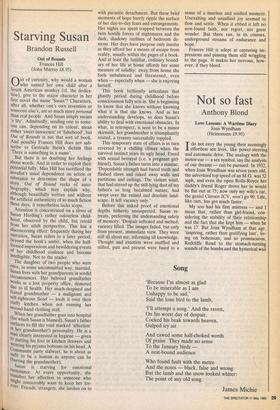Starving Susan
Brandon Russell
Out of Bounds Frances Hill (John Murray £8.95) Out of curiosity, why would a woman who named her own child after a South American monkey (cf. the dedica- tion), give to the major character in her first novel the name 'Susan'? Characters, after all, whether one's own invention or someone else's, are so much more personal than real people. And Susan simply means 'a lily'. Admittedly, sending one to some- one can, depending on its colour, mean either 'sweet innocence' or 'falsehood', but Out of Bounds is not that sort of book. And possibly Frances Hill does not sub- scribe to Gertrude Stein's dictum that 'There is something in a name'.
But there is no doubting her feelings about words. And in order to exploit their Potential fully, Miss Hill has sacrificed the novelist's usual dependence on action or substance to determine the shape of a story. Out of Bound reeks of auto- biography, which may explain why, although beautifully written and without the artificial authenticity of so much fiction these days, it nonetheless lacks scope.
Attention is Concentrated on a sliver of Susan Harding's rather colourless child- hood, observed by the child, but retold from her adult perspective. This has a disconcerting effect: frequently during her narration, Susan refers to a later period, beyond the book's ambit, when the half- formed impressions and bewildering events of her childhood coalesce and become intelligible. Not to the reader.
The daughter of two people who were °nee, in some uncommitted way, married, Susan lives with her grandparents in sordid circumstances. Her beloved grandfather Works in a lost property office, demoted due to ill health. Her much-despised and feared grandmother — a malignant and self-righteous fiend — lords it over their stuffy kitchen when not running her second-hand clothing stall. When her grandfather goes into hospital (for which Susan is blamed), Susan's father Surfaces to fill the void marked 'affection' in her grandmother's personality. He is a Man clearly interested in hygiene — given to putting his feet in kitchen drawers and wearing his pyjama bottoms on his head. A Communist party stalwart, he is about as unfit to be a human as anyone can be (barring the grandmother). Susan is starving for emotional sustenance. At every opportunity, she transfers her affection to someone who might conceivably want to keep her for- ever. Friends, strangers, she latches on to with parasitic detachment. But these brief moments of hope barely ripple the surface of her day-to-day fears and estrangements.
Her nights are spent trapped between the twin hostile forces of nightmares and the dark, shadowy outlines of bedroom de- mons. Her days have purpose only insofar as they afford her a means of escape from reality, usually within the pages of a book.
And at least the familiar, ordinary bound- ary of her life at home affords her some measure of solidity: away from home she feels unbalanced and threatened, even when — especially when — she is enjoying herself.
This book brilliantly articulates that ghastly period during childhood before consciousness fully sets in. She is beginning to know that she knows without knowing what it is that she knows. And as her understanding develops, so does Susan's ability to deal with emotional obstacles. In what, in retrospect, is seen to be a minor skirmish, her grandmother is triumphantly routed, a tyranny successfully toppled.
This temporary state of affairs is in turn reversed by a chilling climax when the survival instinct rears its ugly head. Faced with sexual betrayal (i.e. a pregnant girl- friend), Susan's father turns into a maniac: 'Dependable strength had bared teeth and flashed claws and raked away walls and partitions and ceilings. The violent wind, that had stirred up the still-lying dust of my father's so long becalmed nature, had swept over the ruined and desolate land- scape. It left vacancy only.'
Before this naked proof of emotional depths hitherto unsuspected, Susan re- treats, preferring the undemanding safety of memory: 'Despair softened and melted; vacancy filled. The images faded, but only from present, immediate view. They were still all about me, informing all knowledge. Thought and emotion were muffled and stilled, past and present were fused to a sense of a timeless and unified moment. Unexalting and unsullied joy seemed to flow and settle. When it ebbed it left no new-found faith, nor regret, nor great wonder. But there ran, in its courses, underground streams of endurance and hope.'
Frances Hill is adept at capturing im- pressions and pinning them still wriggling to the page. It makes her nervous, how- ever, if they bleed.














































 Previous page
Previous page